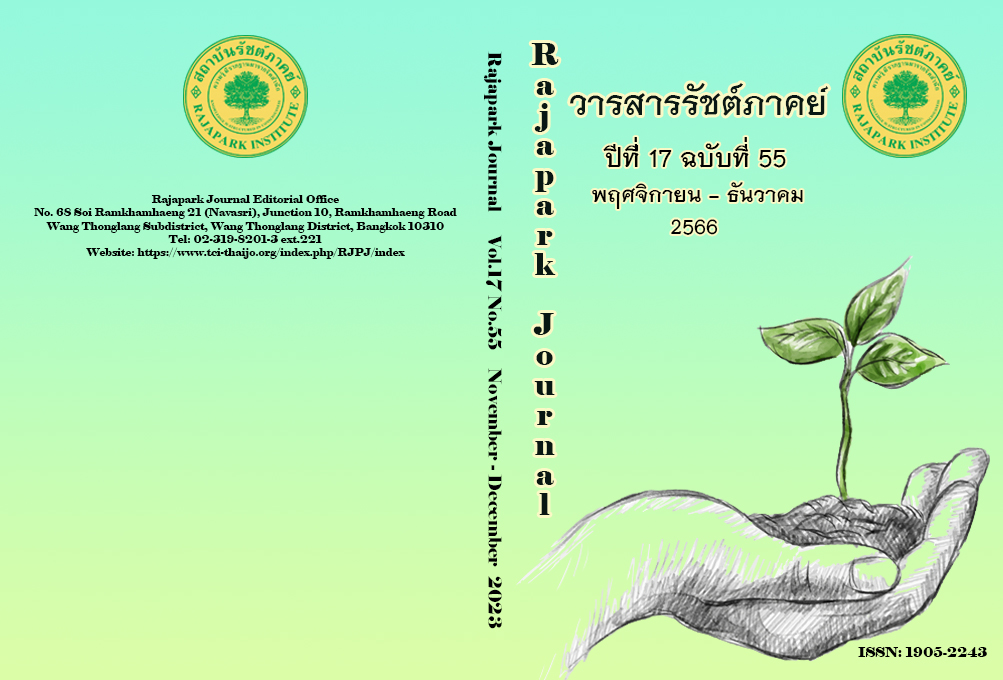The School Administrators Competency Model for Management Effectiveness in the 21st Century, Suratthani Primary Educational Service Area Office 3
Main Article Content
Abstract
The objectives of this research were 1) to study the states and ways; 2) to create and evaluate the form; and 3) to study the result of using the competency components of school administrators for effective school administration in the 21st century under the Surat Thani Primary Educational Service Area Office 3. This research is descriptive research using quantitative and qualitative data, which is mixed-methods research. The total population was 382 people. The tools used to collect data were questionnaires, interviews, and assessment questionnaires. Qualitative data were analyzed using content analysis. The statistics used are percentage, mean, and standard deviation. The results of the research found that 1) the current state of competency of educational institution administrators Overall, the executives' performance is at the highest level. And obtained guidelines for developing competency in six areas. 2) The competency model for school administrators consists of two components: 1) The competency component of school administrators has six competencies, namely communication and motivation. Management with vision and teamwork focuses on the achievement of good service in the area of personal and personnel development. 2) Components of the process for effective educational institution administration in the 21st century. Results of the evaluation of the draft model in terms of accuracy and appropriateness. Overall, it was found that accuracy was at a high level. And appropriateness is at the highest level. 3) The result of the demonstration, by evaluating the possibility and advantage, is at the highest level.
Article Details

This work is licensed under a Creative Commons Attribution-NonCommercial-NoDerivatives 4.0 International License.
Views and opinions appearing in the Journal it is the responsibility of the author of the article, and does not constitute the view and responsibility of the editorial team.
References
Anannanawee, P. (2010). Principles, Theories of Educational Administration (3rd ed.). Montree.
Drucker, P. F. (2005). The Effective Executive. Wadsworth.
Hona, P. (2019). A Competency Development Model of School Administrators for Thailand 4.0[Doctoral Dissertation, Nakhon Sawan Rajabhat University].
Jaisue, J. (2022). Early Childhood Education Management in 21th Century Model of Private Schools in Chonburi Province[Doctoral Dissertation, North Bangkok University].
Jiamthong, K. (2018). Skills of School Administrators under Secondary Educational Service Area Office 32 in the 21st Century[Master’s Thesis, Maha Sarakham Rajabhat University].
Kaewdang, R., & Suwannasan, C. (2001). Compilation of Subject Matter, Theory and Practice in Educational Administration. Sukhothai Thammathirat Open University.
Koontz, H., & Odonnell, C. (2001). Essentials of Management. McGraw-Hill.
Krejcie, R. V., & Morgan, D. W. (1970). Determining Sample Size for Research Activities. Educational and Psychological Measurement, 30(3), 607-610.
Lawalee, B. (2017). School Administrators’ Role in the Age of Globalization. Academic Journal of Mahamakut Buddhist University Roi Et Campus, 6(2), 207.
Ministry of Education. (2005). Civil Service Act on Teachers and Educational Personnel, B.E. 2004. Ministry of Education.
Namyota, A. (2012). The Development of Linear Structural Relationship Model of School Administrators’ Competencies Affecting School Effectiveness[Doctoral Dissertation, Sakon Nakhon Rajabhat University].
Noxanman, S. (2016). Competency of Administrators of Industrial and Community Education College under the Vocational Education Commission[Doctoral Dissertation, Hatyai University].
Office of the Civil Service Commission. (2004). Human Capital and the Development of Human Resource Management Competencies. Office of Research and Development Personnel Report Office.
Office of the Education Council. (2017). National Education Plan 2017-2036. Phrikwarn Graphic.
Paophan, C. (2016). The 1st National Academic Education Conference: Educational Management for Local Development to the ASEAN Community. A New Direction in the 21st Century.
Phattharawanichanon, K. (2011). Analysis of Core Competency Components for Use in Evaluating Civil Servants: A Case Study of the Office of the Teachers and Educational Personnel Commission (TEPC)[Master’s Thesis, Srinakharinwirot University].
Pongsriwat, S. (2005). Leadership Theory and Practice: Art and Science to Complete Leadership. Chiang Rai Rajabhat University.
Sanrattana, W. (2013). A New Educational Paradigm the Case for 21st Century Studies. Tipayawisut.
Songkitipisal, M. (2009). Factors Affecting the Effectiveness of Basic Education Administration for Secondary Schools in the Southern Region of Thailand[Doctoral Dissertation, Ramkhamhaeng University].
Sriharan, B. (1999). Using a Linear Interlaced Cascading Level Format to Study Educational Components Related to School Effectiveness[Doctoral Dissertation, Srinakharinwirot University].
Stufflebeam, D. L., Madaus G.F., & Scriven M.S. (2000). Evaluation Model. Kluwer Academic.
Sukhunphan, A. (2012). Total Quality Management Affecting Effectiveness of School under the Chanthaburi Primary Educational Service Area Office[Master’s Thesis, Rambhai Barni Rajabhat University].
Suksriwong, S. (2007). Management: Form the Executive’s Viewpoint (3rd ed.). GP Cyberprint.
Suratthani Primary Educational Service Area Office 3. (2021). Basic Education Development Plan 2019-2022 (Revised Version for Fiscal Year 2021). Suratthani Primary Educational Service Area Office 3.
Tavornkanlapachai, W. (2017). A Competency Model of the Basic School Administrator in the Next Decade[Doctoral Dissertation, North Bangkok University].
Thamnimit P. (2018). Educational Policy Agenda in the 21st Century: Alternative Policy or Survival Policy of Thailand[Doctoral Dissertation, Mahidol University].
Thongmeekhwan, C. (2021). Model of Development of Instructional Administrators' Competency Management Electrical Professional Teachers in Institute of Vocational Education Southern Region 1[Doctoral Dissertation, North Bangkok University].
Yuangkham, T. (2009). The Relationship Between Transformational Leadership Characteristics and The Effectiveness of Basic Educational Institutions under the Jurisdiction of the Nan Educational Service Area Office, Area 2[Master’s Thesis, Uttaradit Rajabhat University].


